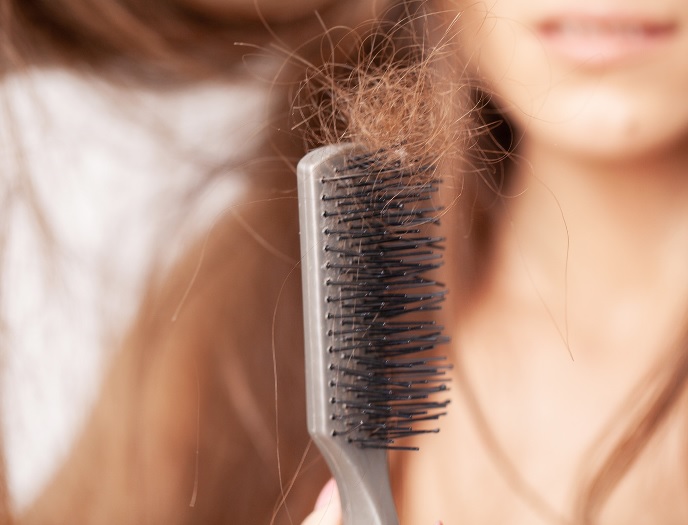
Here are some tried and trusted ways to stop hair loss, and regrow your hair.
Hair loss in females can be caused by various factors such as hormonal changes, genetics, stress, nutritional deficiencies, medical conditions, or certain medications. Cases vary from person to person, but here are some of the best general tips to help prevent or minimise hair loss in females:
Healthy Diet
Ensure you’re consuming a balanced diet rich in vitamins, minerals, and proteins. Foods like leafy greens, fruits, lean proteins, and nuts can promote hair health. Your hair is no different to any other part of your body in the sense that the better you eat, the more it will thrive. Supplying your hair with balanced nutrients is absolutely key.
Manage Stress
Stress can contribute to hair loss, so practice stress-reducing techniques such as meditation, yoga, deep breathing exercises, or hobbies you enjoy. Many people do not realise just how much of a problem stress can be for the hair. Stress could very likely be causing your excessive shedding, so be sure to try to find ways to destress in order to shed less.
Avoid Harsh Treatments
Limit the use of heat styling tools, chemical treatments, and tight hairstyles that can damage hair follicles and lead to hair loss, particularly if you are already prone to hair loss. Also, try to avoid these harsh treatments and products during your seasonal hair loss period. Most women experience seasonal hair loss in autumn and early spring.
Gentle Hair Care
Use a mild shampoo and conditioner suitable for your hair type. Avoid excessive brushing when hair is wet, as it is more prone to breakage. Brushing wet hair will not cause hair loss, but it won’t help if you are already prone to excessive shedding.
Avoid Tight Hairstyles
Avoid hairstyles that pull on the hair, such as tight ponytails, braids, or cornrows, as they can cause traction alopecia. Traction alopecia is very common in women, but it can easily be prevented.
Scalp Massage
Massaging your scalp regularly can improve blood circulation to the hair follicles and promote hair growth. Scalp massaging has become a very popular way of treating hair loss, and it can be done by either using your fingers, or even more effectively by using a scalp massage shower brush.
Specialist Supplements
Consult with a healthcare professional to determine if you have any nutritional deficiencies contributing to hair loss. They may recommend supplements such as biotin, iron, or vitamin D. If you want something much more potent and effective, then opt or a hair specialist supplement like HR23+. HR23+ uses a key blend of vitamins and potent extracts that counter hair loss, and support healthy hair growth. 9 in 10 female users noticed visible improvements in their hair.
Avoid Smoking
Smoking doesn’t directly cause hair loss, but it can restrict blood flow to the hair follicles, leading to hair thinning. Quitting smoking helps improve overall hair health, as well as every other aspect of your health.
Micro Needling
A derma roller is a small roller device that is covered in tiny needles that can range in length from 0.25mm to 1.5mm. When rolled over the scalp or hairline, it creates tiny punctures in the skin, forcing it to heal. As the wounds repair, they produce protein and collagen, which helps stimulate hair growth.
Regular Exercise
Regular physical activity can improve circulation, reduce stress levels, and promote overall well-being, which can indirectly benefit hair health. Do not underestimate how a healthy body can contribute to healthy hair growth.
Protect Your Hair from the Sun
Excessive sun exposure can damage hair and lead to hair loss. Wear a hat or use a protective hair product when exposed to the sun for prolonged periods. This should be an absolute must during the hotter months of the year.
Summary
Remember that it may take time to see results, and individual responses to treatments may vary. If you’re experiencing significant hair loss, it’s best to consult with a dermatologist or healthcare professional for personalised advice and treatment options.


Leave a Reply